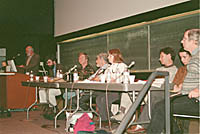
January 24, 2000
First 'narratives' forum produces two quite different perspectives
By Jim Burns
For the 75 members of the campus community who attended the first of three campus
forums on UCSC's Narrative Evaluation System last week, the discussion focused on
two distinctly different proposals.
 |
| The panel at the forum discussed different proposals for narratives and grading
systems. Photo: Karin Wanless |
A second, proposed by psychologist Barbara Rogoff, would retain the spirit of the Narrative Evaluation System (NES), but replace narratives with performance evaluations--a change that Rogoff said would "simplify the process of writing and reporting evaluations" and give faculty and students a better idea of the areas of assessment.
Rosenblum and Rogoff were joined on a panel at the forum by George Brown, chair of the Academic Senate's Committee on Educational Policy; Senate chair Roger Anderson; Loren Steck, past president of the Alumni Association and current trustee of the UC Santa Cruz Foundation; Graduate Council chair David Belanger; physicist Zack Schlesinger; and undergraduate Manuel Schwab.
The vast majority of the faculty and student speakers at the Media Theater forum spoke in favor of retaining the NES or modifying it to reflect aspects of Rogoff's plan.
The forum last week was the first of three planned to solicit campus input on the Narrative Evaluation System in the wake of a December meeting of the Academic Senate called to consider replacing the NES with the conventional UC grading system. That meeting was prompted by a petition signed by more than 170 members of the senate.
By a one-vote margin, the senate in December voted to move the matter to its CEP and Graduate Council for consideration. At the forum last week, Brown said his committee will make recommendations on the matter at the February 23 meeting of the senate.
Rosenblum's proposal to make narratives optional reflects a belief held by a number of UCSC faculty that the NES is making it more difficult for the campus to attract and retain students with strong academic records and to communicate the quality of UCSC students to graduate and professional schools and prospective employers. "I know companies that will not consider UCSC students" who present them with narratives as their transcripts, Rosenblum said, adding that people outside UCSC see the NES as a "pass-fail system" that does not promote serious scholarship.
The NES, Rosenblum also concluded, "is largely responsible for the campus's laid-back image."
Rogoff, on the other hand, noted that grades have only been an option in all UCSC classes for two years--making it premature to change to a system of mandatory grades. "We should closely examine the optional GPA system in three years when we will have data to determine whether there is a problem that needs solving."
She did, however, favor a change that makes narratives more like performance evaluations. "Some faculty regard a good NE to be like a long, personal letter of recommendation--we should revise the norm to respect a template-based brief evaluation that contextualizes the dimensions of students' performance," Rogoff said.
Many of the speakers at the first forum echoed Rogoff's belief that an assessment system that provides more information than a grade has educational value--and, in the process, may actually attract students to UCSC.
Computer engineer Kevin Karplus, meanwhile, wondered whether the increase in grades in recent years is "changing the culture" on campus. More students seem to be "interested in getting exam points" and incidents of plagiarism are up in his classes, he reported.
Karplus also noted that at least one institution is reconsidering the value of an educational environment that places a reduced emphasis on grades. Faculty at Harvard Law School, he said, recently voted to do away with grades in their students' first year because "the students were getting too competitive."
Members of the campus community may still attend two other forums on the NES. The second in the series takes place today (Monday, January 24) from 4 to 6 p.m. in Classroom Unit 2. In addition, the annual Convocation on Teaching, scheduled for Monday, February 14 (changed from Friday, February 11), will explore the subject: "NES and Pedagogy: Are Narrative Evaluations Important to Teaching and Learning at UCSC?" The convocation will take place from 3:30 to 5:30 p.m. in Classroom Unit 2.
Previous Currents stories on the NES:
Continuing the discussion of the NES
Senate narrowly postpones vote on narrative evaluations
Proposal to eliminate 'narratives' goes before Academic Senate